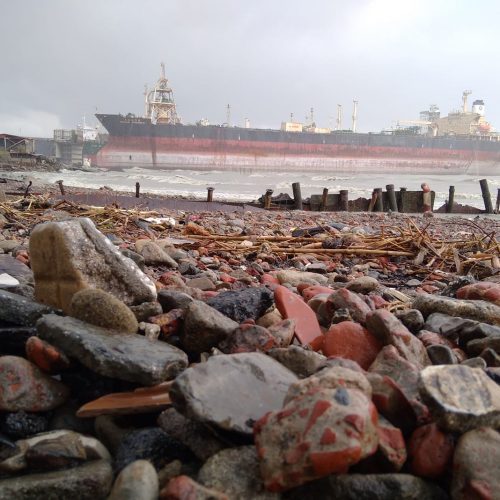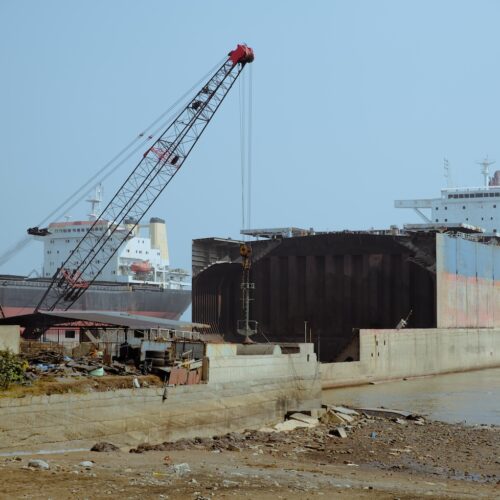Press Release – Documentary reveals SBM’s toxic trade of ships in Alang
Dutch program Zembla recently released their investigation on SBM Offshore’s shipbreaking practices in South Asia. In a documentary shown on Dutch television, and now available on YouTube, Zembla reconstructs the last voyage and scrapping of the mercury-laden tanker YETAGUN, owned by the Dutch oil and gas multinational.
Experts contracted by SBM Offshore warned the company about the high toxicity of the ship and that workers could inhale extremely dangerous mercury fumes during demolition, leading to lasting neurological damage or even death. E-mails and confidential documents obtained by Zembla show that SBM Offshore attempted to conceal the high concentration of mercury in the ship’s steel [1], in order to avoid clean-up costs. The gas tanker was sold for breaking to Hooghly Shipbreakers Ltd, a beaching yard in Alang, India [2].
The NGO Shipbreaking Platform, European Environmental Bureau (EEB) and Zero Mercury Group had warned Indian authorities of the breach of international waste laws, and urged India to halt the import of the contaminated ship. Despite an initial rejection, the permission to import the vessel was eventually given. The circumstances under which the beaching and breaking of the vessel were allowed are still unclear, but documents obtained by the Platform show that the Indian authorities admitted lacking capacity to detect mercury contamination beyond the slops.
In their statements to Zembla, SBM Offshore and Hooghly Shipbreakers maintain that the demolition was carried out in a safe way, and hold forth a so-called Statement of Compliance with the Hong Kong Convention and inspection report - both issued by Japanese classification society ClassNK - as evidence. However, undercover recordings and discussions with several workers that dismantled the YETAGUN reveal a shocking account of the actual conditions at the beaching yard. Workers are not provided with appropriate personal protective equipment and were completely unaware of the poisonous mercury contamination. Several stated that full safety gear is distributed only when inspections take place. Toxicologists that have reviewed the documents obtained by Zembla say it is impossible that no high levels of mercury were detected during cutting operations, as claimed by ClassNK.
It is not the first time that journalists visiting Indian shipbreaking yards unannounced and undercover document a reality that starkly contrasts with the industry efforts to greenwash beaching. In 2016, DanWatch revealed dire conditions at a yard Maersk, and ClassNK, had approved. Recently, also French TV brought back a similar account of Alang.

NOTES
[1] The YETAGUN operated in a gas field in Myanmar for years. Mercury is a naturally occurring element present in virtually all oil and gas fields. Concentrations are especially high in the South American and East Asian region. Mercury can contaminate the structure of offshore units and ballast waters.
[2] Hooghly Shipbreakers shares the same ownership with Priya Blue yard, which has recently been under the spotlight for a fatal accident. According to a local whistle-blower, the cash buyer involved in the sale of the YETAGUN was Best Oasis, a wholly owned subsidiary of Priya Blue Industries. It is not the first time SBM sells its old vessels to yards located on the dirty and dangerous beaches of South Asia. The FPSOs MARLIM SUL and FALCON ended up in Alang in 2017 and 2016 respectively. The STAR OLBA was scrapped in Chattogram, Bangladesh in 2015.
Related news

Press Release – Major explosion at Bangladesh shipbreaking yard kills two workers and severely injures five
A fire broke out on board the Malaysian-owned vessel BUNGA KELANA 4, beached at Mahinur Ship Breaking yard.
... Read More
Platform News – NGO Shipbreaking Platform presents Annual Report 2015
The NGO Shipbreaking Platform presents its Annual Report 2015. Check the new Annual Report to find out more about: – our findings about global shipbreaking practices in… Read More

Platform News – NGO Shipbreaking Platform presents Impact Report 2018/2019
These past two years the Platform has won support for sustainable ship recycling in the financial sector while raising the stakes for ship owners who opt for… Read More

Platform publishes South Asia Quarterly Update #24
Five workers suffered an accident on South Asian beaches in the last quarter of 2020.
... Read More
Press Release – NGOs and trade unions denounce certification issued to PHP yard by classification society RINA
In October, the PHP Family (Peace Happiness and Prosperity) shipbreaking yard received a Statement of Compliance with the Hong Kong Convention [1] by the Italian classification society… Read More

Press Release – Brazil set to violate three international environmental treaties in sinking PCB-laden aircraft carrier in the Atlantic
Environmentalists denounce Brazilian Navy for ‘criminal negligence’.
... Read More
